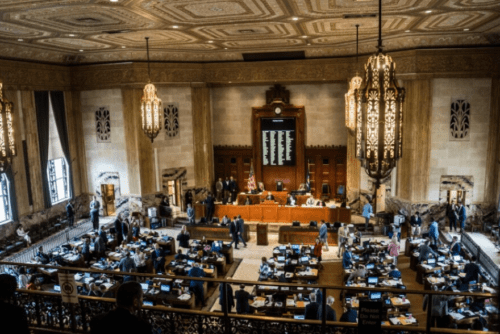
6.11.23 – Shreveport Times
During this year’s session 179 bills were passed. Those bills include a “Don’t say gay” bill and the ban on gender-affirming care for minors. Although these bills passed, they still require the governor’s signature.
The Louisiana State Legislature began its 2023 Regular Legislative Session April 10 and adjourned on June 8. During the final session, Louisiana lawmakers passed an approximately $45 billion budget.
The budget included a chunk of the state’s estimated $2.2 billion in extra revenue on temporary $2,000 teacher pay raises, infrastructure projects, offsetting expiring federal pandemic relief funds and paying down retirement debt.
During this year’s session 179 bills were passed. Those bills include a “Don’t say gay” bill and the ban on gender-affirming care for minors. Although these bills passed, they still require the governor’s signature.
Here are just a few of the bills that are awaiting Gov. John Bel Edwards’ signature following the adjournment of the 2023 Regular Legislative Session.
Passed Bills

House Bill 56
West Monroe Sen. Stewart Cathey’s introduced Senate Bill 56. This bill would reinstate what’s known at the annual Second Amendment Sales Tax Holiday.
Cathey told USA Today Network, “this will provide welcome tax relief and help spur sales for our retailers. This is something everybody has the ability to take advantage of.”
This bill passed and was sent to Edwards’ desk.
House Bill 247
House Bill 247 was introduced by New Orleans Rep. Mandie Landry’s would provide a $500 tax credit toward purchases of gun safe storage devices.
According to Landry, she hopes her bill can provide a layer of safety in Louisiana’s signature city and throughout the state.
In a tweet, Landry said: “In 4 years of being a lege, I am the most proud of this bill. Gun rights are a divisive issue – but (the Legislature) just proved that we all agree on gun safety & responsible ownership.”
Of the many bills passed Louisiana lawmakers sent a host of anti-LGBTQ bills to the governor’s desk.
Anti-LGBTQ bills

House Bill 648
Louisiana’s state Senate revived a bill to ban gender affirming healthcare for transgender minors, with House Bill 648.
Republican Pollock Rep. Gabe Firment proposed this bill and said gender affirming healthcare is experimental and dangerous. Gender affirming healthcare can range from counseling to puberty blockers to hormones to surgery.
Get the Storm Watch newsletter in your inbox.
Latest news updates during the emergency.
Delivery: VariesYour Email
The full Senate approved this bill, and it was sent to Edwards’ desk. According to USA Today Network Edwards has said he opposes much of the anti-LGBTQ legislation. Edwards’ has the ability to veto Firment’s bill or allow it to become law without his signature.
House Bill 466
House Bill 466, commonly known as the “Don’t say gay” bill, restricts the discussion of gender and sexuality in public school classrooms.
The bill cleared the Senate on a 29-9 vote. According to USA Today Network the supporters of this legislation say the bill is designed to protect children and preserve parental rights.
This bill was introduced by Republican Haughton Rep. Dodie Horton. She told USA Today Network, “God answered many prayers being lifted up by parents today.”
House Bill 81
House Bill 81 introduced by Bossier City Rep. Raymond Crews would require school employees to use the names and pronouns of students on their birth certificates unless they have parental consent.
Teachers can even opt out if they object due to religious reasons. This bill cleared the Senate on Monday, June 5, on a 31-8 vote.
These are just a few of the bills that passed during the legislative session and were sent to the governor’s desk.
Failed Bill
House Bill 211
On June 5, Louisiana’s Senate killed House Bill 211 that would have allowed voters to decide whether to symbolically ban slavery in the state Constitution. This bill comes more than 150 years after the Civil War.
The bill failed on a 21-16 vote.
Democratic Rep. Edmond Jordan introduced this bill and told USA Today Network although slavery was abolished in the U.S. in 1865 the stain has remained in state constitutions where the current language says slavery and involuntary servitude are illegal but include exceptions for forced convict labor.
Greg Hilburn contributed to this story.
